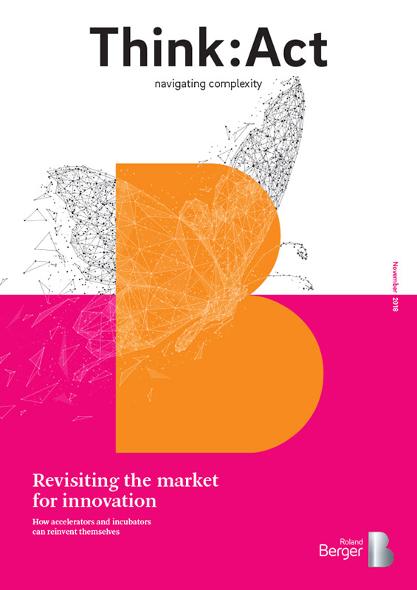How accelerators and incubators can reinvent themselves
![{[downloads[language].preview]}](https://www.rolandberger.com/publications/publication_image/roland_berger_accelerators_incubators_cover_1_download_preview.jpg)
Thousands of accelerators and incubators have been set up around the world to support startups get off the ground. Discover the findings of our new study here.


In the last decade, the number of accelerators and incubators grew fivefold. Servicing the booming startup ecosystem, first-generation incubators built their service offering on the back of standard startup support, made up of office space, mentoring and networking. Meanwhile, accelerators addressed the next level issues of differentiation through investment and access to technologies.

Following the initial craze of the late 2000s, it could be thought that the hype around accelerators and incubators is already over. But is this really the case? Or is the phenomenon continuing and simply changing its form to accommodate the arrival of new types of innovation related collaboration. To understand the current accelerator and incubator landscape, Roland Berger surveyed more than 50 countries, mostly in Europe (41%), Asia (18%) and North America (18%).
To survive, accelerators and incubators must stand out from the crowd, snag the most promising startups and win the attention of successful companies. Specializing and/or internationalizing are key here. The emergence of new operators positioning themselves as open hubs is throwing a spanner in the works, overcrowding the market and increasing complexity.
In a differentiation strategy, the first option is to specialize. As of 2016, 54 percent of accelerators and incubators had a specific specialization. Generally, the more digitally mature a market is, the more specialized accelerators tend to be.
Increasing, internationalization can also be used to attract and compare more candidates. In 2017, 49% of Accelerators and Incubators offered international programs, either through partnerships with foreign entities or with foreign locations.
The role of accelerators and incubators is evolving. Their focus has become in some ways less about startups and more about stakeholders, who increasingly need to understand the innovation market.
When it comes to innovation and technological and economic progress, accelerators and incubators are at the cutting edge. They aid investors in finding and selecting talent, as well as assist them in prioritizing objectives. Accelerator and incubator programs deal with three main clients: companies, venture capital funds and public authorities.
Going forward, accelerators and incubators need to aspire to become the heart and focus of innovation ecosystems, fostering collaboration between researchers and investors, and circulating ideas, capital and technologies.
Accelerators and incubators may become tomorrow's technology transfer organizations between researchers and the industrial world, which requires closer ties between research, companies and startups. To view all findings from our in-depth look at the accelerators and incubators landscape, download the study below.

![{[downloads[language].preview]}](https://www.rolandberger.com/publications/publication_image/roland_berger_accelerators_incubators_cover_1_download_preview.jpg)
Thousands of accelerators and incubators have been set up around the world to support startups get off the ground. Discover the findings of our new study here.
